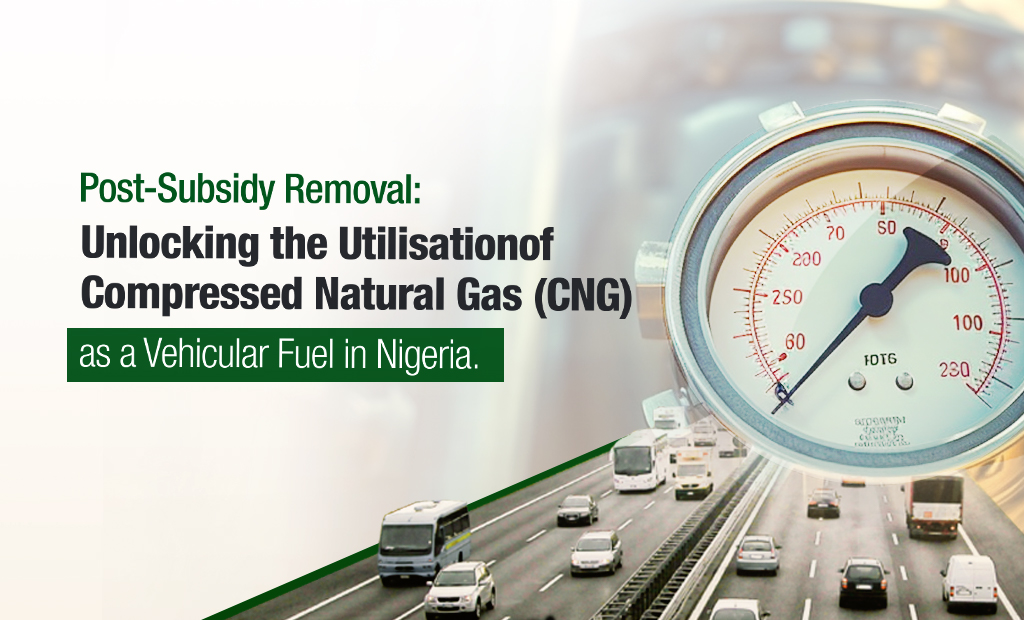The surge in Electric Vehicle (EV) adoption globally, reaching 7.2% market share in 2021, marks a significant shift in transportation. Nigeria introduced its first domestically manufactured EV, the Hyundai Kona, and an EV charging station in 2021, aligning with sustainability trends. However, infrastructure, cost, and regulatory hurdles hinder widespread adoption. Nigeria’s energy access gap, unreliable electricity supply, and high upfront costs pose challenges. Limited financing options and the disparity in EV costs compared to conventional vehicles impede mass adoption. Additionally, the absence of EV mass drivers and inadequate charging infrastructure deter investment. Nigeria’s reliance on crude oil revenue adds complexity as policymakers fear repercussions from the evolving EV market. Bridging infrastructure gaps and addressing economic concerns are crucial for successful EV integration in Nigeria.
Click here to download.
Gas Policy Briefs
The global shift to clean cooking fuels is crucial for achieving Sustainable Development Goal 7 (SDG7) on energy. Approximately 3 billion people rely on solid fuels, causing 4 million premature deaths annually. The World Bank’s Clean Cooking Fund (CCF), a $500 million initiative supported by the Netherlands, Norway, and the UK, aims to mobilize $1 billion in investments. It utilizes results-based financing to catalyze impactful projects, complementing the High-Level Coalition of Leaders for Clean Cooking. The CCF builds on the World Bank’s decade-long experience, showcasing successful models in various countries. Beyond financing, it seeks to create a global platform for knowledge, innovation, and policy coordination to advance clean cooking technologies and policies.
Click here to download.
Accelerating Climate Action: Integrating Science, Mitigation, and Adaptation with Machine Learning
This policy brief emphasizes the urgent global threat of climate change, with a focus on the critical axes of action such as climate science, mitigation, and adaptation. With the Earth already warming over 1 degree Celsius, immediate action is crucial to limit global warming and avoid catastrophic consequences. The United Nations Intergovernmental Panel on Climate Change stresses the need for achieving net-zero greenhouse gas emissions by 2050, requiring transformative changes across various sectors. The brief highlights the importance of understanding and addressing climate risks, with a focus on both magnitude and probability assessments. Additionally, it underscores the significance of climate justice and the co-benefits framework in ensuring equity and a holistic approach to climate action. Integration of machine learning is explored as a vital supplementary tool to enhance climate modelling accuracy, optimize mitigation strategies, and facilitate real-time adaptation responses, contributing to more efficient and timely decision-making.
Click here to download.
Decarbonizing the Gas Supply Chain: Strategies for Mitigation and Abatement
The gas supply chain is complex and inflexible due to production limitations and transportation intricacies, posing challenges in matching supply with demand and risking disruptions. Nigeria has vast but underutilized gas reserves, necessitating investment for exploration and utilization. Mitigation strategies like contingent sourcing, flexible routing, and leveraging RFID technology can enhance supply chain resilience. Decarbonization in the gas sector requires a balance of short-term costs and long-term benefits, aiming to reduce emissions and align with global climate goals. The LNG industry addresses emissions through a comprehensive approach and methane reduction strategies, promoting sustainability and competitiveness in the evolving energy market.
Click here to download.
Gas flaring, the wasteful burning of associated gas in oil production, persists globally and has severe environmental and economic impacts. Nigeria, despite being part of initiatives to reduce gas flaring, contributes 11% of global flaring. In 2022, 12 million tonnes of CO2 were released, costing $0.79 billion. Regulatory challenges, economic factors, infrastructure inadequacies, and community opposition hinder progress. To address this, Nigeria must enforce gas flare penalties, clarify regulatory roles, and build capacity. Implementing carbon credit sales, attracting investments, developing gas-based industries, and fostering international collaborations are vital. Urgent action, like the Nigerian Gas Flare Commercialization Programme, is necessary for mitigating the harmful consequences of gas flaring and achieving zero gas flares by 2030.
Click here to download.
Nigeria exports over 60% of its gas production as LNG and through pipelines, while only 25% is used domestically, and 10% is wasted through gas flaring. A 2018 study by DFID explored the economic benefits of redirecting gas from exports to domestic industries like petrochemicals and fertilizers. It found that such a shift could create around 3 million jobs, compared to just 4,500 from LNG exports. Moreover, using gas for value-added products like LPG and CNG could save billions in foreign exchange. The report also suggested that the export of gas-based products would surpass LNG export values. However, realizing these benefits requires addressing security, infrastructure, and regulatory challenges. Proposed policy interventions include gas pricing reforms, penalties for gas flaring, and incentives for domestic gas industries. Maximizing gas utilization can drive socio-economic change, job creation, and environmental sustainability, but it requires government commitment and reform.
Click here to download.
Post-Subsidy Removal: Unlocking the Utilisation of Compressed Natural Gas (CNG) as a vehicular Fuel in Nigeria
Adopting Compressed Natural Gas (CNG) in Nigeria has significant socio-economic and environmental benefits, aligning with the country’s net-zero target by 2060. Although CNG is cheaper than Petroleum Motor Spirit (PMS), high upfront conversion costs and infrastructure deficits have hindered its widespread adoption. To promote CNG usage, the government should invest in infrastructure development, conduct awareness campaigns, offer fiscal incentives, provide temporary subsidies for vehicle conversion, establish regulatory frameworks, and foster international collaborations. Overcoming these barriers can help Nigeria transition to CNG as a cleaner, cost-effective fuel source, creating jobs, reducing carbon emissions, and enhancing energy sustainability.
Click here to download.
Analysis of Nigeria’s Gas Expansion Plan
Nigeria, a major LNG exporter and possessing significant natural gas reserves, faces challenges in expanding its domestic gas industry despite strong performance in LNG exports. International Oil Companies are opting for more cost-effective projects elsewhere, and the global shift to cleaner energy labels gas as a declining commodity. The Energy Transition Plan (ETP) amplifies the urgency, projecting a demand rise until 2040 followed by a sharp decline due to renewables and affordable carbon capture technologies. To address this, key policy recommendations are outlined. Priorities include enhancing gas infrastructure, diversifying its usage, establishing transparent pricing mechanisms, addressing security concerns, and encouraging international collaboration and investment. These strategies aim to harness Nigeria’s gas potential, especially after removing petrol subsidies, and drive its transition towards cleaner energy. However, successful implementation hinges on dedicated governmental support.
Click here to download.
Oil and gas operations currently contribute 30% of global warming through 80 million tonnes of methane emissions. To limit global temperature rise to 1.5°C, reducing methane emissions is crucial. Methane abatement, achieved by optimizing operational techniques and equipment, offers a cost-effective solution for achieving net zero emissions (NZE). This approach generates approximately USD 45 billion in revenue from captured methane sales, outweighing abatement costs. Emission reduction tactics include ending non-emergency flaring and venting, leak detection programs, vapor recovery units, and more. Implementation of these measures is estimated to reduce total methane emissions from oil and gas operations by over 15% by 2030. Investment of over USD 75 billion is required, with funding sources including oil and gas companies, banks, development initiatives, and governments. Several case studies demonstrate successful strategies for methane reduction, providing insights for policy recommendations. Nigeria, despite having substantial gas reserves, needs to adopt effective policies, monitoring systems, and infrastructure to utilize its resources and contribute to net zero emissions. Financing methane abatement is pivotal, holding vast potential for global emissions reduction and sustainable development.
Click here to download.












